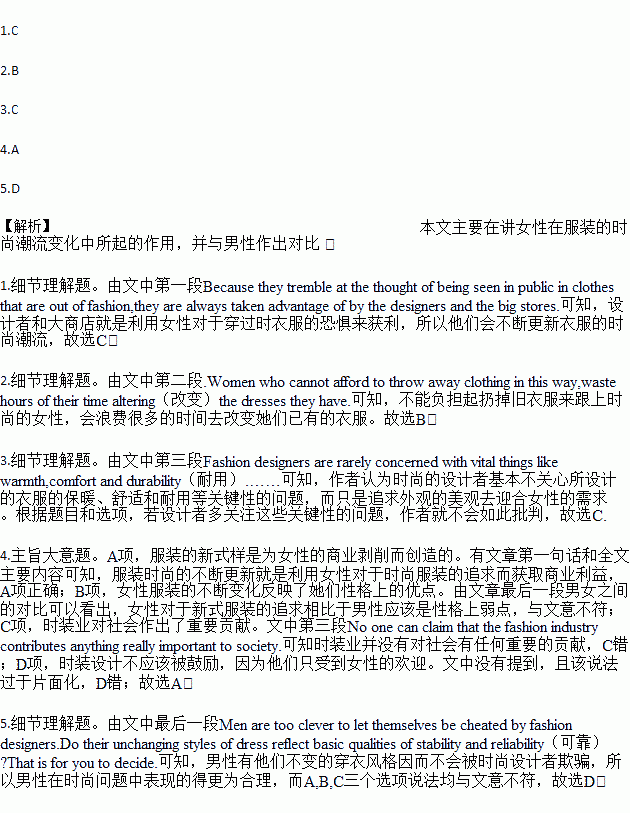题目内容
If women are mercilessly exploited(剥削)year after year,they have only themselves to blame.Because they tremble at the thought of being seen in public in clothes that are out of fashion,they are always taken advantage of by the designers and the big stores.Clothes which have been worn only a few times have to be put aside because of the change of fashion.When you come to think of it,only a woman is capable of standing in front of a wardrobe(衣橱)packed full of clothes and announcing sadly that she has nothing to wear.
Changing fashions are nothing more than the intentional creation of waste.Many women spend vast sums of money each year to replace clothes that have hardly been worn.Women who cannot afford to throw away clothing in this way,waste hours of their time altering(政变)the dresses they have.Skirts are lengthened or shortened;neck-line are lowered or raised,and so on.
No one can claim that the fashion industry contributes anything really important to society.Fashion designers are rarely concerned with vital things like warmth,comfort and durability(耐用).They are only interested in outward appearance and they take advantage of the fact that women will put up with any amount of discomfort,as long as they look right.There can hardly be a man who hasn't at some times in his life smiled at the sight of a woman shaking in a thin dress on a winter day,or delicately picking her way through deep snow in high-heeled shoes.
When comparing men and women in the matter of fashion,the conclusions to be drawn are obvious.Do the constantly changing fashions of women's clothes,one wonders,reflect basic qualities of inconstancy and instability (不稳定)?Men are too clever to let themselves be cheated by fashion designers.Do their unchanging styles of dress reflect basic qualities of stability and reliability(可靠)?That is for you to decide.
1.Designers and big stores always make money .
A. by mercilessly exploiting women workers in the clothing-industry
B. because they are capable of predicting new fashions
C. by constantly changing the fashions in women's clothing
D. because they place great importance on quality in women's clothing
2.To the writer,the fact that women alter their old-fashioned dresses is seen as .
A. a waste of money B. a waste of time
C. an expression of taste D. an expression of creativity
3.The writer would be less critical if fashion designers placed more stress on the of clothing.
A. cost B. appearance
C. comfort D. suitability
4.According to the passage,which of the following statements is true?
A. New fashions in clothing are created for the commercial exploitation of women.
B. The constant changes in women's clothing reflect their strength of character.
C. The fashion industry makes an important contribution to society.
D. Fashion designs should not be encouraged since they are only welcomed by women.
5.By saying "the conclusions to be drawn are obvious" the writer means that .
A. women's inconstancy in their choice of clothing is often laughed at
B. women are better able to put up with discomfort
C. men are also exploited greatly by fashion designers
D. men are more reasonable in the matter of fashion
 名校练考卷期末冲刺卷系列答案
名校练考卷期末冲刺卷系列答案调查表明,有许多青少年有不吃早餐的习惯。请根据表格内容用英语写一篇短文。
原因 | 晚上学习太晚,早上起得迟;用吃早餐的钱去上网玩游戏;一些女孩为保持苗条身材常不吃早餐。 |
结果 | 不利于身体健康;上课时想睡觉;影响记忆力和学习成绩。 |
建议 | 早餐不可少,它能提供全天所需能量的30%。青少年健康应从早餐开始。 |
注意:1.不要逐条翻译,可适当增加情节,使内容连贯。
2.词数100左右;
3.参考词汇:苗条的:slim能量:energy。
A survey shows that many students do not have breakfast.________________________________________
____________________________________________________________________________________________
____________________________________________________________________________________________
____________________________________________________________________________________________
____________________________________________________________________________________________
____________________________________________________________________________________________
____________________________________________________________________________________________
____________________________________________________________________________________________
______________________________________________________

